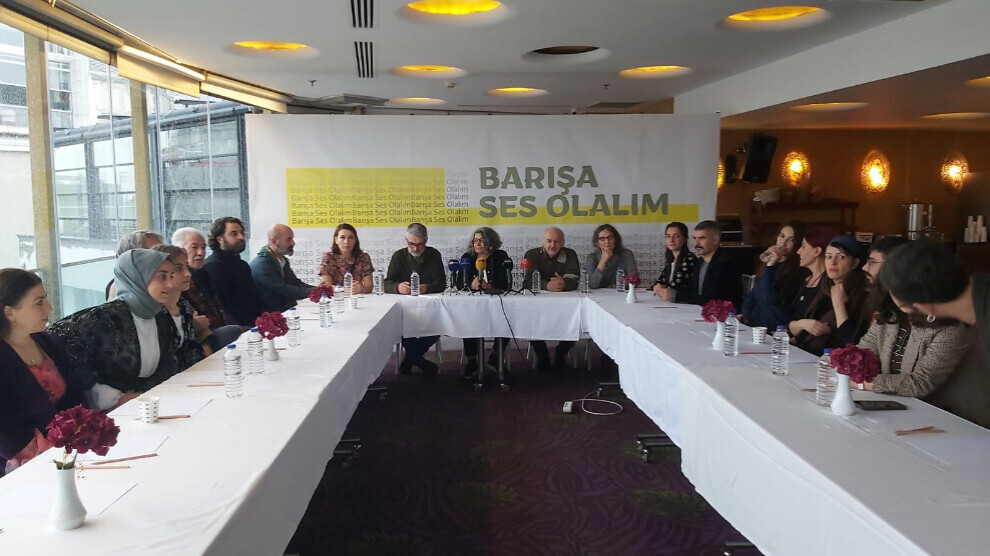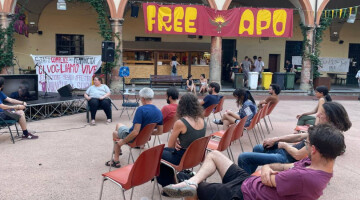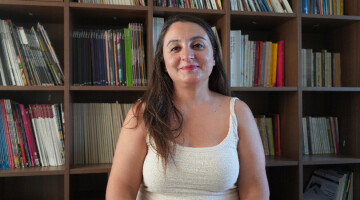In an urgent appeal to the public, hundreds of artists from Turkey called for negotiations on a peaceful solution to the Kurdish question. The declaration "Let us be a voice for peace", signed by 564 personalities, was presented today at the Taksim Hill Hotel in Istanbul. Among the signatories are prominent names such as musician Cevdet Bağca, writer Ayşegül Devecioğlu, art critic and painter Feyyaz Yaman, author Firat Cewerî, director Haşim Aydemir, actress Jülide Kural, musician Mikail Aslan, documentary filmmaker Nejla Demirci, photographer Özcan Yaman, painter Sevinç Altan, author Şanar Yurdatapan and director and DEM deputy Sırrı Süreyya Önder.
Writer Ayşegül Devecioğlu read the declaration, the full text of which reads as follows:
“We, the undersigned people of art and literature, would like to share with the public our objection to the obstacles preventing the Republic from attaining a democratic, populist and libertarian character in its second century. Concerned about the future of Turkey, we wish to be a modest voice in this environment of multiple crises. If we remain silent today, there may be no one left to speak tomorrow.
We, the people of art and literature, who will not stand by and watch Turkey waste another century, propose to weave together a future in which all ethnic, religious and cultural identities live freely and are not oppressed or subjected to pogroms.
We have the responsibility to speak a new word, to form a new sentence in this muddy ground where the legislature is under the pressure of the government, the independent judiciary has lost its independence under the 'one man regime', secular and free education has fallen behind the times, trustees have been appointed to universities and people's municipalities, women are subjected to violence, brain drain has reached an extreme level, and youth are leaving the country out of fear for their future.
We believe that we need a new way of looking and seeing in this atmosphere of deepening social and economic crises, where democratic possibilities are excluded in solving problems arising from denial and assimilation, and violence is constantly updated as a policy.
For a hundred years, many humanitarian demands for rights, especially the democratic demands of the Kurds and the freedom of belief of Alevis, were postponed, not resolved, and consolidated by the governments as a phenomenon of separation between our peoples. The divisions between peoples and cultures have been deepened.
Pressurized by multiple crises, public opinion is under heavy manipulation by the government. Those who govern Turkey are distracting the public from the real agenda with secondary agendas. Isolation practices have turned into a management apparatus in the hands of the autocratic government. Society is under an ideological and political siege. Isolation and war policies deepen social and economic crises.
Thousands of people are unlawfully imprisoned for their political views and are almost political hostages. Practices in prisons that violate human rights are increasing day by day. Thousands of political prisoners are currently on hunger strike against isolation practices. The demands of political prisoners on hunger strike must be listened to and resolved through negotiations.
We believe that Turkey's problems should be solved through negotiation. Starting in 2013, the 'Resolution Process', which created great hope for reconciliation among the people, was a valuable experiment. Negotiations with Abdullah Öcalan, one of the interlocutors of the issue, created the possibilities for peace. With the consent of a large part of society, the process can start again. Society must be courageous for peace. It should not be afraid to dialog and talk.
It is our open call to everyone in the position of interlocutor; the conditions set forth by universal law and human rights need to be fulfilled without hesitation by the political representatives of the time. The government must abandon the politics of oppression, isolation and war. We believe that these ideas and suggestions by people of art and literature will be embraced by all those who desire the construction of social peace."
Speaking at the meeting, Feyyaz Yaman from Karşı Sanat (Counter Art) said that they came together to "protect peace". Yaman said, "But while doing this, our framework has been in the field of art. Art has never experienced such an environment of violence, victimization and injustice as today. Its voice has never been silenced like this. In each of these situations, we see that this silence is not only due to the economic difficulties experienced by artists. Artists cannot perform, writers cannot write their books. The real reason for this whole crisis is that the social consensus has also broken down at the legal level. This silencing environment we are experiencing all over the world today prompts us to seek our rights. If art is to speak a critical language, then it must first weave rights and the coexistence of peoples. We invite artists to stand together against those who continuously impose a process of extermination and to claim this need. We have something to do for this, we need to produce a process of real dialogue. We have to bring together and defend the injustices we have suffered in this environment of differences on our common ground of righteousness. As those who believe in the power of art, we invite everyone to re-establish this peace."















